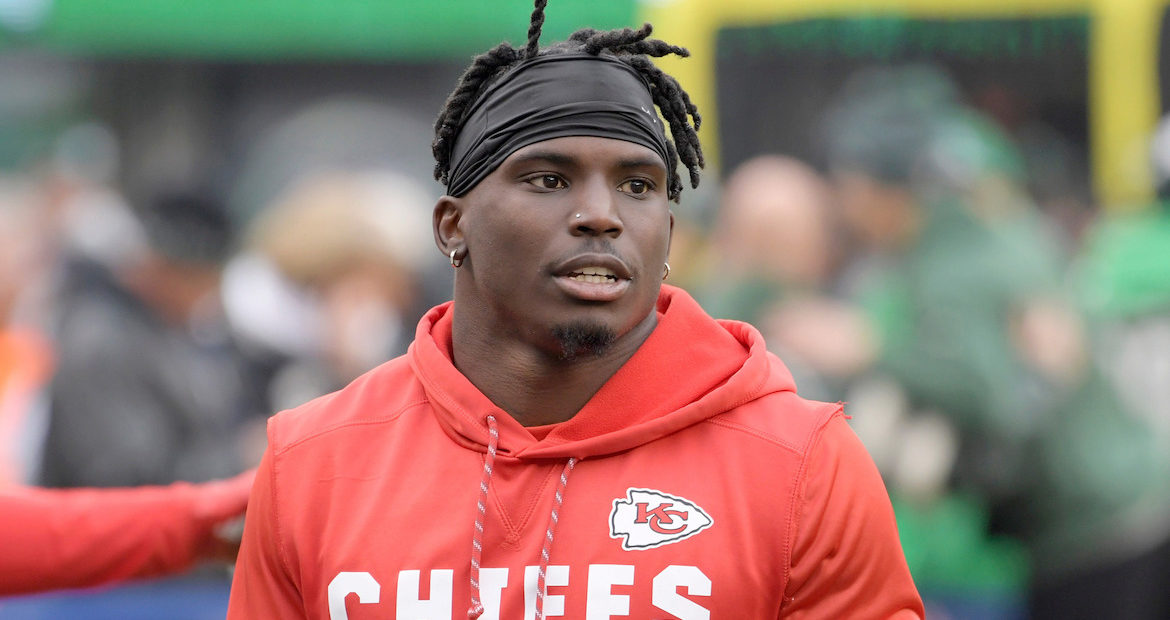
The NFL Really Needs to Exit the Policing Business
“Based on the evidence presently available, the NFL cannot conclude that Mr. Hill violated the Personal Conduct Policy. Accordingly, he may attend Kansas City’s training camp and participate in all club activities.” – NFL Statement on Tyreek Hill
Just like that the world’s most incompetent self-appointed police department strikes (out) again.
In a long-awaited decision that was guaranteed to drop on a Friday, Hill, who along with his ex-fiancé Crystal Espinal were under investigation for the broken arm of their 3-year old son, was cleared from suspension or fine by the league. Not even a slap on the wrist. Nothing. He’ll be at Chiefs camp next week.
Nothing for the widely released audio in which Hill clearly threatened Espinal while talking about their son. “You need to be terrified of me too, bitch,” Hill said in chilling fashion. Nothing after uttering those disturbing words to the same woman he pleaded guilty of choking and punching while she was pregnant and they were in college.
In a longer version of the audio, Hill denies hurting his son, though admits being hard on him in an exchange between Espinal and Hill that sounds like they’re vying for a most dysfunctional parent award. Remember the boy is just THREE YEARS OLD.
Hill’s attorney floated a four-page letter denying and explaining aspects of the recording, but the receiver’s words are undeniable.
In June, Hill was legally cleared by Johnson County but not because he or Espinal were proven innocent. “We believe that a crime has occurred,” Johnson County District Attorney Steve Howe said at the time. “However, the evidence in this case does not conclusively establish who committed the crime against this child.”
NFL head of Special Counsel and Investigations Lisa Friel reportedly spent eight and a half hours with Hill, who according to Yahoo Sports, presented compelling evidence to corroborate the four-page letter responding to the accusation. Espinal was unwilling to talk.
Unable to draw a conclusion, the league issued a statement dripping in vagueness. “Our understanding is that the child is safe and that the child’s ongoing care is being directed and monitored by the Johnson County District Court and the Johnson County Department for Children and Families,” the statement read.“ “Similarly, based on the evidence presently available, the NFL cannot conclude that Mr. Hill violated the Personal Conduct Policy,” it continued.
But here’s what the Personal Conduct Policy says: “It is not enough simply to avoid being found guilty of a crime. We are all held to a higher standard and much conduct ourselves in a way that is responsible, promotes the values of the NFL, and is lawful.” There is a long list of prohibited conduct, which includes a provision that seems to align with Hill’s behavior: “actual or threatened violence against another person, including dating violence, domestic violence, [and child abuse].
You need to be terrified of me too, bitch.
If Hill threatening a woman is not enough to warrant some form of suspension when players are getting suspended for four games for smoking pot or for whatever it is that Tom Brady supposedly did with air in a football, the NFL ought to rip up their Personal Conduct Policy and bury their police badges.
The number of games in each case is far less relevant than the stark lack of consistency, much of which stems from a Personal Conduct Policy that is impossible to apply.
The threatening portion of the Hill’s case is matter of interpretation, but the audio clearly line up with the verbiage in the NFL’s Personal Conduct Policy. But the possible child abuse portion Hill’s case is a matter of evidence, which is especially murky and complicated because it involves a young child in protective services with a bevy of sealed documents. How can the NFL determine whether Hill’s conduct “poses a genuine danger to the safety and well-being of another person” or “undermines or puts at risk the integrity of the NFL?” How can it draw sensible conclusions about so many of these cases when the alleged victim is too unwilling to speak to the league? It can’t.
The result is that the NFL issues too many punishments that feel like pin the tail on the suspension board, and far more rooted in politics and reactiveness than justice.
How on earth can Ezekiel Elliott get six games after the NFL’s prosecutor recommended none but nothing for Hill? No wonder Jerry Jones was so livid.
Ex-Giants kicker Josh Brown got one game despite his wife telling police he abused her more than twenty times. Outcry. League went extra hard on Elliott despite little to no evidence. Outcry. Let’s not overdo it again. ZERO games for Hill, despite the chilling threat and history of violence. Even with the NFL’s hollow messaging of not tolerating violence against women. Outcry. It’s as if each new punishment is framed to compensate for the NFL’s last screw up.
The league just needs to get out of the policing business.
As Deadpsin’s Diana Moskovitz, who covers sex crimes and abuse, pointed out on the TFG Podcast. “We really need to rethink the idea of the league playing police, judge and jury,” she says. “I think the history bears that out. The fact that over all these years and we still have all these scandals and they’re so repetitive.”
Moskovitz is right. Cases involving domestic violence or assault are often so highly complex and layered that experts and actual law enforcement have a difficult enough time sifting through them. The NFL issuing, or not issuing punishments, without real evidence to support their decisions has been a disservice to the league and society for too long.



